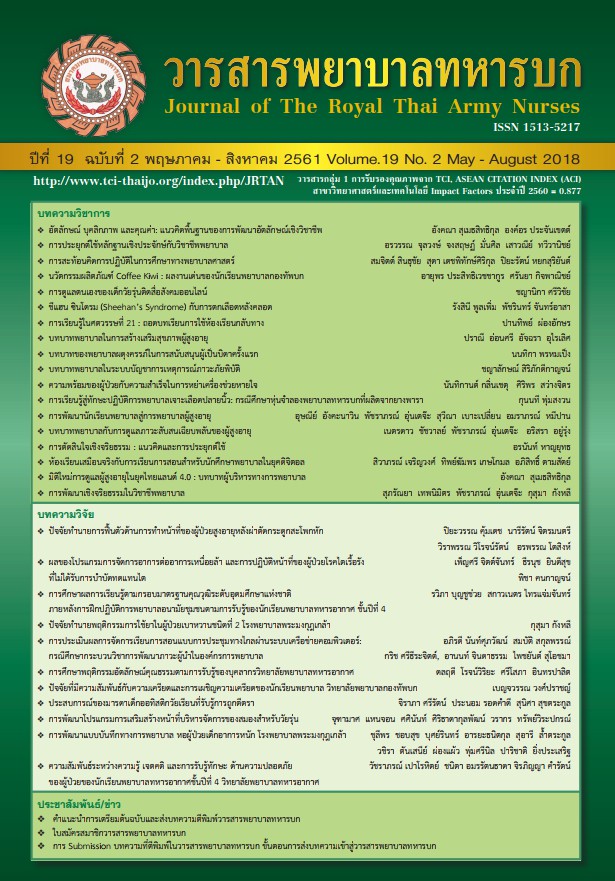A Study of Moral Identity by Perception of Personnel of Royal Thai Air Force Nursing College
Keywords:
Moral identity, Perception of personnel, Royal Thai Air Force Nursing CollegeAbstract
This descriptive research aimed to study perception of moral identity among personnel of Royal Thai Air Force Nursing College composed of honesty, responsibility, and generousness. Participants were 282 personnel of Royal Thai Air Force Nursing College including director and lecturer, staff, and air force student nurses. Instruments were moral identity behavior questionnaires for each group. All instruments were approved by three experts which CVI 0.6 -1.00 and reliability were 0.82, 0.89, and 0.95 respectively. Data analyses were
performed by mean and standard deviation.
The results revealed that
1. The overall of perception of moral identity behavior among director and lecturer was a highest level ( = 4.59, S.D. = 0.55). In addition, the honesty domain was highest level ( = 4.89, S.D. = 0.28), the responsibility domain was high level ( = 4.47, S.D. = 0.49), and the generousness domain was high level ( = 4.49, S.D. = 0.54).
2. The overall of perception of moral identity behavior among staffs was a high level ( = 4.33, S.D. = 0.74). In addition, the honesty domain was high level ( = 4.33, S.D. = 0.85), the responsibility domain was high level ( = 4.34, S.D. = 0.61), and the generousness domain was high level ( = 4.33, S.D. = 0.63).
3. The overall of perception of moral identity behavior among air force student nurses was a high level ( = 4.36, S.D. = 0.71). In addition, the honesty domain was high level ( = 4.38, S.D. = 0.68), the responsibility domain was high level ( = 4.17, S.D. = 0.71), and the generousness domain was high level ( = 4.42, S.D. = 0.69).
The results of this study could be used to develop moral identity behavior among personnel of Royal Thai Air Force Nursing College.
Downloads
References
2. Ministry of Digital Economy and Society. National Moral Promotion Master Plan No.1 (B.E. 2016-2021). Bangkok: Ministry; 2016. (in Thai)
3. Khatawanit T. General Psychology. Bangkok; SE-Ed education; 2003. (in Thai)
4. Srisa-ard B. Fundamental Research. Bangkok: Suviriyasarn; 2013. (in Thai)
5. Thaithae S., Wichiputchraporn W., Niyamabha A., Damsuwarn W. A Causal Model of Teacher Leadership and Authentic Leadership of Administrators, with Organizational Culture as Mediator, Affecting effectiveness of Nursing education Institutions. Journal of The Royal Thai Army Nurses; 19(1):105-114. (in Thai)
6. Makmeesab, A. ( 2557). Code of Ethics for School Administrators. Suthiparithat 2014; 28(87): 305-322.
7. Yoopakdee, P. A study of moral behavior of the admistrator base on opinion of teacher and staff in office of the Basic Education Commission under Chaiyaphum Primary Educational Service Area Office 3. (Thesis). Chaiyaphum: Chaiyaphum Rajabhat University; 2008. (in Thai)
8. Karnjanapun R. Ethical for manager. Bangkok: Ramkhamhaeng University; 2009. (in Thai)
9. Poonchai S., Wongsaita N., Kanglee k. The Development of Integration the Infusion Instruction Model with Eight Moral Basics Based on Sufficiency Economic in the Concept, Theory and Nursing ProcessCourse in the First Year Nursing Students at the Royal Thai Army Nursing College. Journal of The Royal Thai
Army Nurses 2009; 10(2):15-24. (in Thai)
10. Pakdeto R., Arpaichiraratana C. An Application of Transformative Learning in Arranging Learning Experience Regarding Ethical Decision Making for Nursing Students. Thai Red Cross Nursing Journal 2016; 9(1): 1-10. (in Thai)
Downloads
Published
How to Cite
Issue
Section
License
บทความหรือข้อคิดเห็นใดใดที่ปรากฏในวารสารพยาบาลทหารบกเป็นวรรณกรรมของผู้เขียน ซึ่งบรรณาธิการหรือสมาคมพยาบาลทหารบก ไม่จำเป็นต้องเห็นด้วย
บทความที่ได้รับการตีพิมพ์เป็นลิขสิทธิ์ของวารสารพยาบาลทหารบก
The ideas and opinions expressed in the Journal of The Royal Thai Army Nurses are those of the authors and not necessarily those
of the editor or Royal Thai Army Nurses Association.






